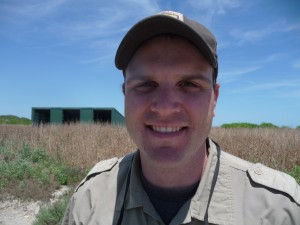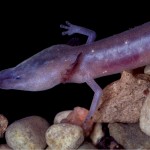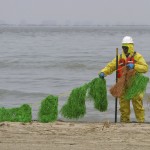How Budget Cuts and Oil Spills Threaten ‘World’s Most Endangered Sea Turtle’
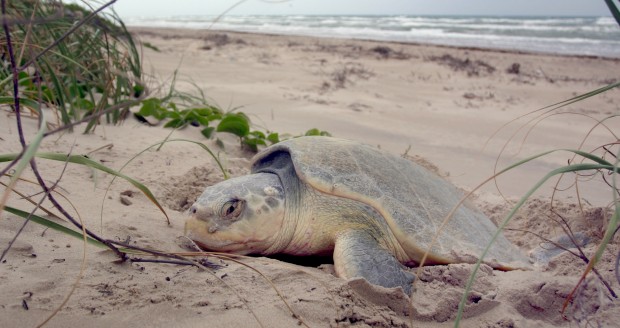
Courtesy of the National Park Service.
A Kemp's Ridley sea turtle laying its eggs on the Texas Gulf Coast.
Around this time every year, female Kemp’s Ridley sea turtles arrive like clockwork on Matagorda Island, on the Texas Gulf Coast.
“During the day they’ll craw up, usually closer to the dunes, and they’ll dig out an area and they’ll lay a nest of several eggs,” says Jeremy Edwardson, a biologist with the U.S. Fish and Wildlife Service. “Then they move back out to the water’s edge.”
The Island is a wildlife refuge maintained by the service. Edwardson says it’s usually kept free of all human activity.
But not this year, because of an ongoing cleanup by state and federal agencies in the wake of a barge accident in the Port of Houston that spilled more than 150,000 gallons of oil. Officials are worried cleanup efforts could hurt the turtles and other wildlife. But the alternative – just leaving the oil on the beach – is not really an option.
“The traffic on the island could potentially impact a turtle that would want to be coming up to nest. They might become disturbed,” Edwardson says.
“If a female turtle were to essentially drag herself up on shore and got coated with that oil, then we need to get that cleaned off of her,” says Kimberly Reich, Director of Texas A&M’s Trophic Ecology and Sea Turtle Research Laboratory.
Reich says sea turtles may also have swam through the oil while it was still at sea. The spilled oil can be toxic to the turtle, and if it gets in the nest, it can damage the eggs.
All told, it’s shaping up to be a bad year for the Kemp’s Ridley turtle. And researchers say it will be made worse by recent budget cuts.
“Back in December 2013, the U.S. Fish and Wildlife Service decided to reduce funding to the nesting beach program in Mexico for this current nesting season,” says Pam Plotkin, Director of the Sea Grant Program at Texas A&M. “They have communicated that they will cease funding the program in 2015.”
While some turtles lay their eggs on the Texas coast, the primary beach for the Kemp’s Ridley is in Mexico. Tens of thousands of them used to arrive there every year. By the 1980s, the number had dropped to just a few hundred, so the U.S. Fish and Wildlife Service and the Mexican government partnered to save the turtles from the brink of extinction.
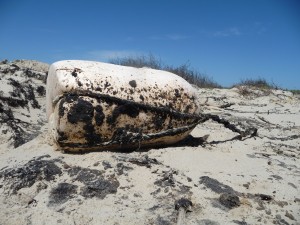
Mose Buchele/StateImpact Texas
More than 150,000 gallons of heavy fuel oil spilled into the Houston Ship Channel on March 22, 2014 after a collision between an oil barge and a ship.
Conservation in Mexico paired with efforts on the Texas coast paid off, says Plotkin.
“And over the years, the recovery became more apparent, and was actually increasing to the point where it was almost a 19 percent increase every year,” she says.
Then in 2009, the population stopped growing. Researchers believe the BP oil spill likely contributed to the lull, just as they worry about the current spill. But Plotkin says without stable funding, impacts will be hard to understand. The Fish and Wildlife Service says it made the cuts in response to mandated across-the-board budget cuts (the so-called “sequestration”) last year, an explanation for which Plotkin has little sympathy.
“My program was sequestered, too,” she says. “And I had to make decisions about where to cut, and Fish and Wildlife Service had to make similar decisions, and unfortunately they decided that they were going to cut the most successful program in their history.”
Outside funding has arrived to continue the Mexico project this year. But Plotkin says the long-term prospects for Kemp’s Ridley conservation in Mexico are still unknown.
On top of that uncertainty, the Turtle Research Lab’s Kimberly Reich says a separate pool of money that funded work with the turtles on the Texas Coast as part of the BP oil spill settlement has dried up as well.
“We have about 20 percent of the budget we had last year,” she says.
